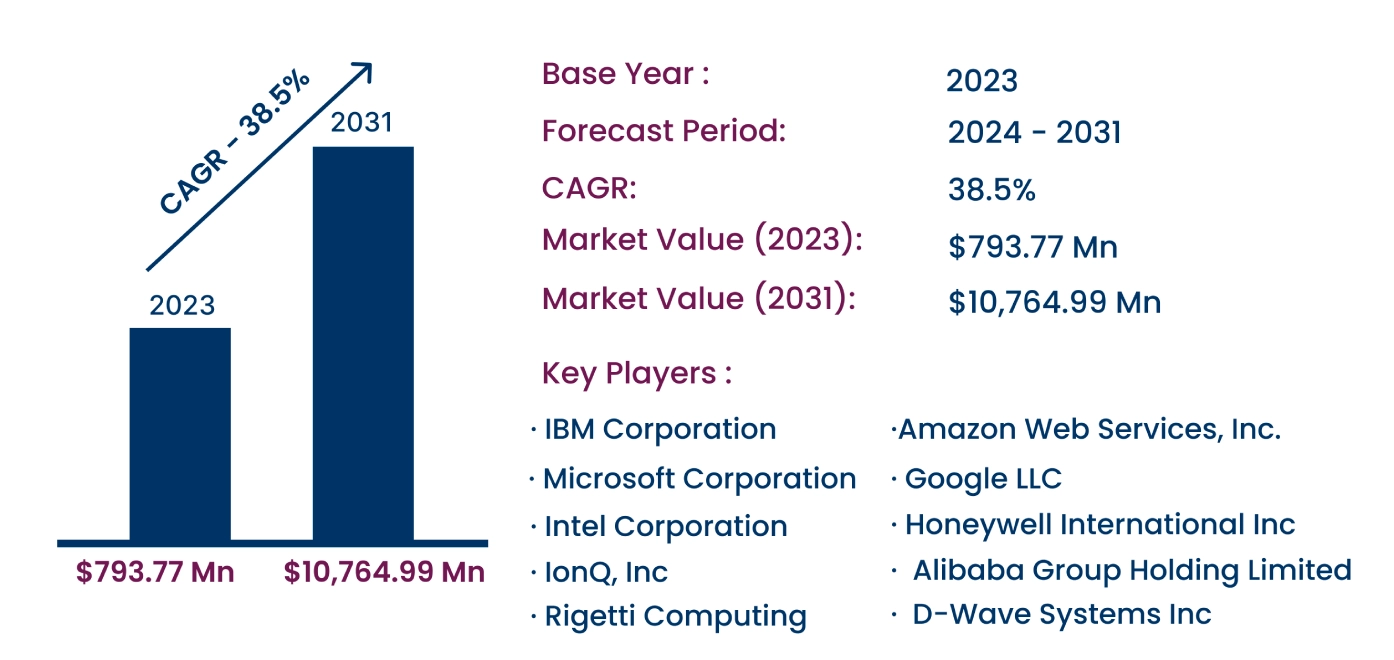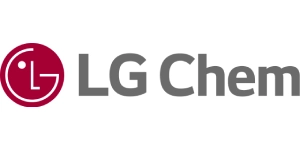Global Cloud-Based Quantum Computing Market to Reach USD 10,764.99 Million by 2031 | CAGR of 38.5%
Category : IT And Telecommunications | Published Date : Nov 2024 | Type : Press Release
Cloud-based Quantum Computing Market Scope & Overview:
As per the Consegic Business Intelligence newly published report, the Cloud-based Quantum Computing Market size was valued at USD 793.77 million in 2023 and is projected to grow at a CAGR of 38.5% during the forecast period, reaching USD 10,764.99 million by 2031. This innovative market offers businesses access to quantum processors and advanced computational resources via cloud platforms, enabling the execution of quantum algorithms without requiring extensive on-premises infrastructure. Industries such as finance, healthcare, logistics, and pharmaceuticals benefit significantly from cloud-hosted quantum computing, which provides scalable and cost-efficient solutions for tackling complex computational challenges.
The report comprises the Cloud-Based Quantum Computing Market Share, Size & Industry Analysis, based on Component (Hardware, Software, Services), Technology (Quantum Annealing, Quantum Gate, Topological Quantum Computing), Application (Drug Discovery, Financial Modeling, Climate Simulation, Cryptography, Machine Learning & AI, Optimization Problems), Deployment Mode (Public Cloud, Private Cloud, Hybrid Cloud), End-User Industry (Healthcare & Pharmaceuticals, BFSI, IT & Telecom, Aerospace & Defense, Energy & Utilities), and Region (North America, Europe, Asia-Pacific, Latin America, Middle East & Africa), and Forecast, 2024-2031.
The report contains detailed information on Cloud-Based Quantum Computing Market Trends, Opportunities, Value, Growth Rate, Segmentation, Geographical Coverage, Company Profiles, In-depth Expert Analysis, Revenue Forecast, Competitive Landscape, Growth Factors, Restraints or Challenges, Environment & Regulatory Landscape, PESTLE Analysis, PORTER Analysis, Key Technology Landscape, Value Chain Analysis, and Cost Analysis.
Growing adoption of Quantum-as-a-Service (QaaS) models and advancements in quantum cryptography applications are driving market growth.
Segmental Analysis :
Based on components, the market is segmented into Hardware, Software, and Services.
- The hardware segment accounted for the largest share in 2023, driven by the critical role of quantum processors and simulators in performing high-speed computations.
- The software segment is projected to grow at the fastest rate, supported by increasing demand for quantum development kits and optimization software to facilitate algorithm development across industries.
Based on technology, the market is segmented into Quantum Annealing, Quantum Gate, and Topological Quantum Computing.
- The quantum gate segment held the largest share in 2023, attributed to its foundational role in universal quantum computing and widespread applications in cryptography and machine learning.
- The quantum annealing segment is anticipated to grow at the fastest rate, driven by its ability to solve optimization problems in logistics and finance efficiently.
Based on application, the market is segmented into Drug Discovery, Financial Modeling, Climate Simulation, Cryptography, Machine Learning & AI, and Optimization Problems.
- The drug discovery segment accounted for the largest market share in 2023, due to its potential to revolutionize pharmaceutical research by simulating molecular interactions at unprecedented scales.
- The cryptography segment is expected to grow at the fastest CAGR, driven by the rising need for quantum-resistant encryption technologies in data security.
Based on deployment mode, the market is segmented into Public Cloud, Private Cloud, and Hybrid Cloud.
- The public cloud segment dominated the market in 2023, supported by its scalability and cost-effectiveness for organizations accessing quantum resources.
- The hybrid cloud segment is expected to grow rapidly, owing to its ability to balance data security and scalability, making it ideal for industries like finance and healthcare.
Based on the end-user industry, the market is segmented into Healthcare & Pharmaceuticals, BFSI, IT & Telecom, Aerospace & Defense, and Energy & Utilities.
- The healthcare & pharmaceuticals segment accounted for the largest revenue share in 2023, due to its extensive use of quantum computing in drug discovery and clinical trial optimization.
- The BFSI segment is projected to grow at the fastest rate, fueled by the adoption of quantum algorithms for fraud detection, risk analysis, and cryptographic solutions.
Based on regions, the market is segmented into North America, Europe, Asia-Pacific, Middle East and Africa, and Latin America.
- North America: Dominated the market in 2023, with the U.S. driving adoption through significant R&D investments and strong presence of tech giants like IBM and Microsoft.
- Asia-Pacific: Expected to grow at the fastest CAGR, supported by robust investments in quantum research and technological advancements in China, Japan, and South Korea.
| Report Attributes | Report Details |
| Study Timeline | 2018-2031 |
| Market Size in 2031 | USD 10,764.99 Million |
| CAGR (2024-2031) | 38.5% |
| Component | Hardware (Quantum Processors, Simulators), Software (Development Kits, Optimization Software), Services (Consulting, Integration, Maintenance) |
| Technology | Quantum Annealing, Quantum Gate, Topological Quantum Computing |
| Application | Drug Discovery, Financial Modeling, Climate Simulation, Cryptography, Machine Learning & AI, Optimization Problems |
| Deployment Mode | Public Cloud, Private Cloud, Hybrid Cloud |
| End-User | Healthcare & Pharmaceuticals, BFSI, IT & Telecom, Aerospace & Defense, Energy & Utilities |
| By Region | North America(U.S., Canada, Mexico) Europe(U.K., Germany, France, Spain, Italy, Russia, Benelux, Rest of Europe) APAC(China, South Korea, Japan, India, Australia, ASEAN, Rest of Asia-Pacific) Middle East & Africa(GCC, Turkey, South Africa, Rest of MEA) LATAM(Brazil, Argentina, Chile, Rest of LATAM) |
Top Key Players & Competitive Landscape :
The Cloud-Based Quantum Computing Market is highly competitive, with leading players focusing on technological advancements and strategic collaborations. Companies such as IBM Corporation and Microsoft Corporation dominate the market with extensive offerings, while emerging players drive innovation in niche applications.
List of prominent players in the Cloud-based Quantum Computing Industry:
- IBM Corporation (USA)
- Microsoft Corporation (USA)
- Amazon Web Services, Inc. (USA)
- Google LLC (USA)
- Honeywell International Inc. (USA)
- Intel Corporation (USA)
- Alibaba Group Holding Limited (China)
- D-Wave Systems Inc. (Canada)
- Rigetti Computing (USA)
- IonQ, Inc. (USA)
Recent Industry Developments :
- July 2024: Planqc raised €50 million in Series A funding to establish a quantum computing cloud service, targeting healthcare and automotive sectors.
- March 2024: NVIDIA launched quantum-computer simulation microservices to advance research in materials science and chemistry.
- August 2023: D-Wave enhanced its Constrained Quadratic Model (CQM) solver for optimization problems, improving business application efficiency.












